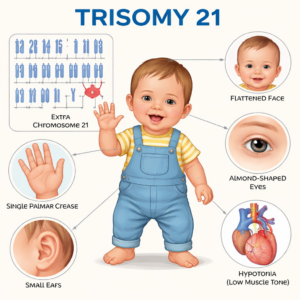What are they?
Single-gene disorders are some of the most well-known and researched rare diseases. This is because their causes are easily understood, and how they are inherited is considered to be very clear and simple.
With single-gene disorders, the precise gene mutation that causes them is known, and the mutation occurs in one single gene. The other name for single gene disorders is Mendelian disorders.
Single-gene disorders are rare diseases – meaning that they affect less than 200,000 people in the US. However, the numbers of affected individuals from all of the single gene disorders combined create a rare disease community of millions of people.
Some of the most commonly known single disorders include Cystic Fibrosis, Fragile X, and Tay-Sachs. There are more than 10,000 known and identified single-gene disorders.
Examples
- Rett syndrome
Rett syndrome is caused by a single gene mutation in the MECP2 gene. The majority of cases, over 99% are not inherited but are the result of a new mutation. This single gene disorder is diagnosed almost exclusively in girls – boys with this gene mutation rarely survive pregnancy, and those that do rarely survive the first year of life. Rett syndrome is a neurological condition with multiple symptoms.
2. Marfan syndrome
Changes in the FBN1 gene cause this single-gene disorder. It is known to be inherited in an autosomal dominant pattern, with some cases being de novo or new mutations. Symptoms of this rare disease generally affect the ocular, skeletal, and cardiac systems of individuals.
3. Huntington’s disease
Huntington’s disease is a serious genetic disorder that affects an individual’s mental and physical abilities, usually in mid-adulthood. This single-gene disorder is progressive, and mental and physical decline worsens. Life expectancy for this single-gene disorder is anywhere from 10-25 years following the appearance of the first symptoms.
4. Fragile X syndrome
Changes in the FMR1 gene are responsible for causing this single-gene disorder. It is inherited in an X-linked dominant pattern. This rare disease affects intellectual ability and behavior, which can range from mild to moderate.
Diagnosis
Single gene disorders are by their nature easier to diagnose accurately. Their known and straightforward modes of inheritance, make them easy to identify in families.
Targeted genetic tests exist for many single gene disorders – it is easier to test when you know what you are looking for, and diagnosis of single gene disorders is more accurate than with rare diseases with more complex genetic causes and inheritance patterns.
However to ensure the accuracy of a diagnosis – the process for single gene disorders would include genetic testing, a detailed understanding of the family medical history (including what is known about their genetic health), and an understanding of an individual’s symptoms and other medical conditions that may suggest a diagnosis for a potential rare disease patient.
It is important also to undergo some form of genetic counseling, to understand more about the process for diagnosis of a single gene disorder, the possible testing options, and what a confirmed diagnosis of a single gene disorder might mean.



